Study & Listen To Music For Better Spatial Reasoning Skills
Want better Spatial Reasoning skills? Study Music & Listen To Music!

Both sides are guilty, if we’re honest. One side would have you believe that those who study music at a young age will be brilliant Rhodes Scholars ready to be the next world leader. Others believe that the research that seems to indicate that music makes a person more intelligent isn’t as solid as some would have us believe. Others, and maybe you’re one of these people, haven’t heard about the research.
Here’s how the story goes: one good reason to learn a musical instrument is because positive changes in your brain take place. Scientists did a study where they brought in a number of everyday people and had them watch their favorite movie while hooked up to a monitor that measured brain waves. In the background they listened to words spoken in Mandarin that sounded like “mi”. Because Mandarin is a language based on tone of voice, when “mi” is spoken with the tone going up, that is one word. When the vocal inflection goes down, that’s another word and when the inflection stays flat, it’s another word.
Those who had at least 6 years of musical training were able to track the changes in these different vocal inflections much easier than those with no musical training. Remember that they were focused on their favorite movie so this was done automatically in the brain as measured by their brain waves. This, according to scientists, proves that studying music causes positive changes to the brain that allow for a higher level of auditory processing.
Let’s admit that measuring brainwaves while somebody listens to “mi” for hours on end isn’t the most exciting of experiments but how about something a little more practical? When a baby is born, they have in their brain billions of cells that are looking for a place to call home. Brain cells form pathways based on experience and those pathways strengthen over time as repetitive actions are taken.
This is why reading to your child is important. Each time you read to them, pathways are formed and strengthened causing language to form. It’s like weightlifting for brain cells. The same thing happens with music. When you play classical music for your child, musical pathways are formed and strengthened improving the way the brain processes sound. If you’re wondering why you should care if your child has musical pathways, it’s because musical pathways resemble the pathways that strengthen spatial reasoning. Somebody with good spatial reasoning skills could, for example, rapidly construct a jigsaw puzzle and it is the same kind of thought process that directly relates to chemistry, architecture, and many other math and science fields. IQ tests and other intelligence based tests that are used for college admissions tests and other standardized assessments are heavy on spatial reasoning.
Some pro-music people overstate the positive effects of music. First, it seems to only work when classical music is used. Because that style of music tends to be more complicated, it gives the brain a better workout. Second, although there is evidence that actually learning an instrument makes the effects last a lot longer, but music tends to stimulate these formed pathways to turn on but they only stay turned on for a relative short amount of time. Improved spatial reasons goes away after just an hour from the time the music is turned off. In other words, we don’t walk around with these improved skills.
Still, though, the mountain of studies has made the conclusions pretty irrefutable: those who study and listen to music will see improved brain function. Listed here are merely two of the many studies that prove this point.
____________________________________________________________________________________________
——————————————————————————————–


